
Top Online Kanban Board Apps for Better Workflow 2025
Discover the best online kanban board tools to boost team productivity and streamline projects in 2025. Find your perfect online kanban board today!

Level Up Your Workflow with the Right Kanban Board
Overwhelmed by scattered tasks and projects? An online Kanban board can bring clarity and efficiency to your workflow. This listicle presents 10 top-tier online Kanban board options, comparing features and functionalities to help you choose the perfect tool. Whether you're using Google Workspace, managing a sales team, or simply seeking better personal task management, this list will help you find the ideal online Kanban board to streamline your work. We'll cover popular choices like Trello, Asana, Monday.com, Jira, and more, so you can make an informed decision and boost your team's productivity.
1. Tooling Studio
Tooling Studio offers a powerful suite of Chrome extensions designed to enhance productivity within the Google Workspace environment. Its flagship product, Kanban Tasks, brings the visual clarity and efficiency of online kanban boards directly into Gmail and Google Tasks. This eliminates the need for constant app-switching and allows individuals and teams to manage their workflows entirely within their familiar Google interface. Imagine managing your project tasks directly alongside your emails, seamlessly transitioning between communication and action. This integration is especially valuable for project managers, sales teams, and even freelancers who heavily rely on Google Workspace for their daily operations.
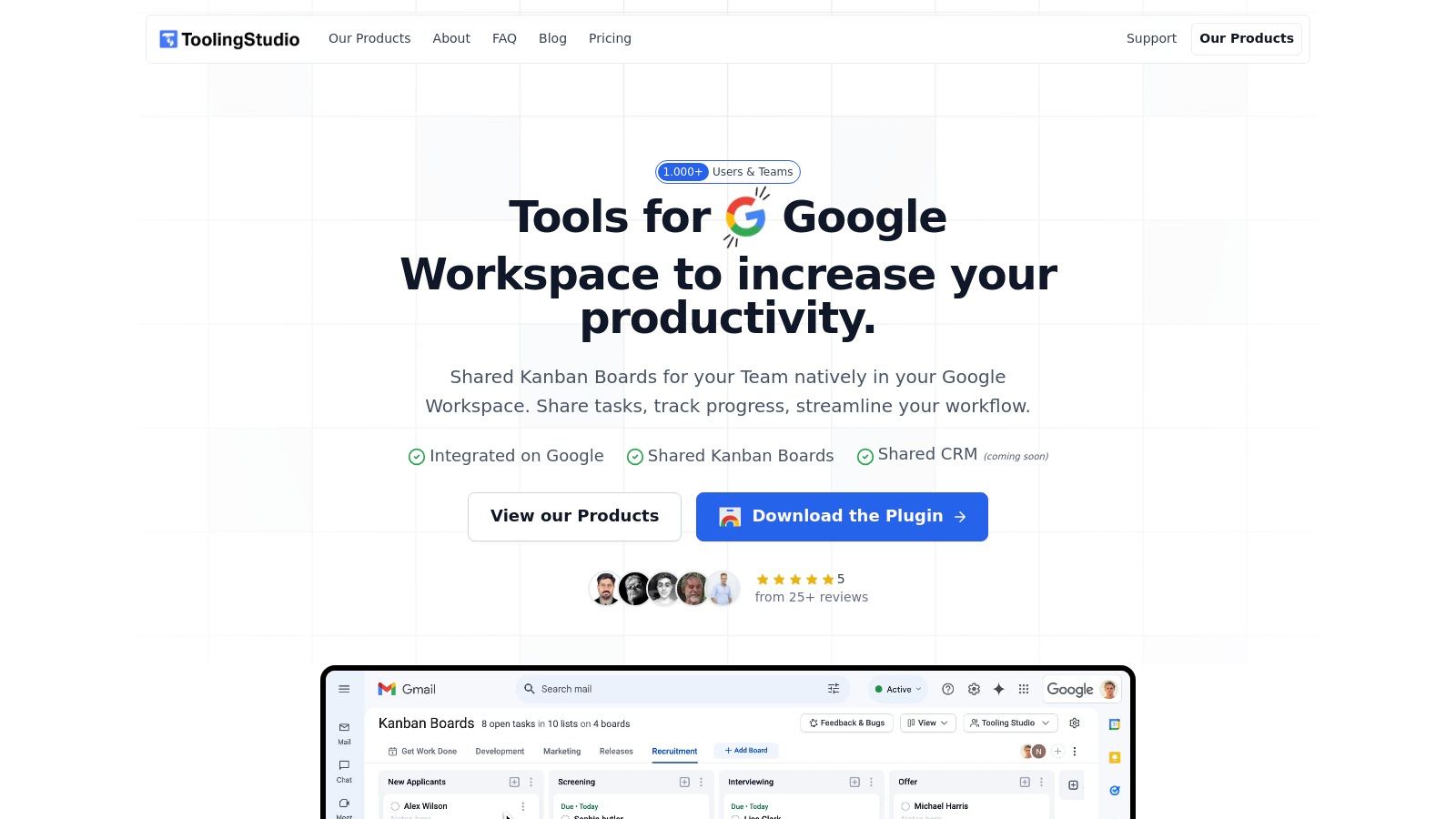
Tooling Studio’s Kanban Tasks allows users to create multiple shared boards, assign tasks, and manage workflows using intuitive drag-and-drop functionality. The near-native design ensures a smooth user experience that minimizes disruption to existing workflows while maximizing efficiency. For example, a marketing team can visualize their content calendar on a Kanban board, dragging and dropping tasks as they progress through different stages – from ideation to publication. Real-time collaboration features, including comments, tags, attachments, and email notifications, ensure everyone stays aligned and informed on project updates. Learn more about Tooling Studio and how to implement it for your team.
Beyond Kanban Tasks, Tooling Studio is expanding its suite of tools. A Sales CRM extension, currently in beta, promises to integrate with Google Contacts, centralizing lead tracking, deal management, and customer interactions within Google Workspace. This upcoming feature will further consolidate essential business workflows, making Tooling Studio a comprehensive solution for managing both projects and sales pipelines.
Pros:
- Native, seamless integration with Google Workspace: Keeps your workflows within a familiar platform, reducing context switching and increasing efficiency.
- Intuitive Kanban board: Drag-and-drop interface simplifies task and project management for both individuals and teams.
- Real-time collaboration: Shared boards, comments, tags, and attachments keep everyone aligned.
- Robust security: Secure authentication and adherence to Google Workspace compliance standards.
- Active development: Regular updates and new features address common Google Workspace limitations.
Cons:
- Chrome dependency: Currently optimized for Google Chrome, limiting browser choice.
- Sales CRM in beta: Full CRM functionality is pending official release.
Tooling Studio's focus on a unified workspace experience within Google Workspace makes it a strong contender for teams and individuals seeking an efficient online kanban board solution. Its intuitive interface, collaborative features, and upcoming CRM integration offer a compelling value proposition for streamlining tasks, enhancing collaboration, and maximizing productivity within the Google ecosystem. While the current Chrome dependency and beta status of the CRM might be temporary limitations, the active development and user-driven approach suggest a promising future for this platform.
2. Trello
Trello is a popular choice for teams seeking an intuitive online kanban board solution. Its visual approach to project management, based on the kanban methodology, utilizes boards, lists, and cards. This system allows teams to organize tasks, track progress, and prioritize projects with ease. Trello is known for its user-friendly interface and drag-and-drop functionality, making it accessible to users of all technical skill levels, from seasoned project managers to those new to kanban. This ease of use makes it a strong contender for teams looking to quickly implement an online kanban board without a steep learning curve. For example, a sales team could use Trello to visually manage their sales pipeline, moving leads through stages like "Prospecting," "Qualifying," "Proposal," and "Closed Won."
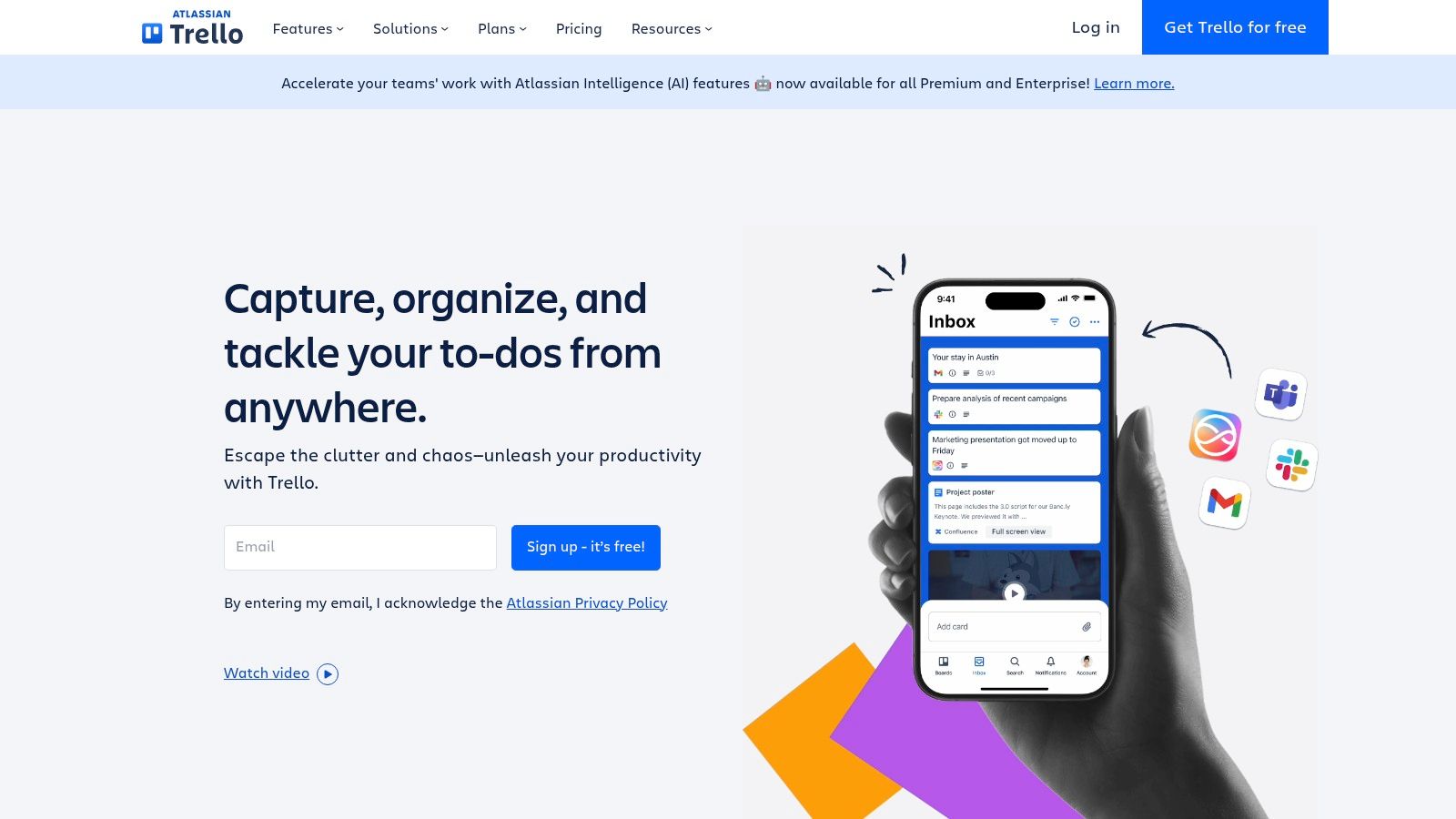
Trello's power lies in its flexible structure and integrations. Customizable boards can be tailored to fit various workflows, from marketing campaigns to software development sprints. Power-Ups extend Trello's capabilities by integrating it with other services like Slack, Google Drive, and Jira, creating a centralized hub for project information and communication. This seamless integration is particularly beneficial for teams already relying on these tools within their Google Workspace environment. Automation capabilities through Butler enable teams to automate repetitive tasks, such as creating checklists or assigning due dates, boosting efficiency. Card features like checklists, due dates, attachments, and comments further enhance task management and collaboration. Mobile apps for iOS and Android ensure that project management can happen on-the-go, a vital feature for busy professionals and distributed teams. You might want to learn more about Trello and its alternatives to see how it stacks up.
Trello offers a generous free tier with substantial functionality, making it an attractive option for small teams and individuals. This free tier includes unlimited boards, lists, and cards, making it a great starting point. Paid plans unlock advanced features like unlimited Power-Ups, larger file attachments, and advanced administrative controls, catering to the needs of larger organizations and complex projects. However, it's worth noting that the free version has limited reporting and analytics capabilities. While Trello's visual nature simplifies project tracking, generating in-depth reports requires a paid subscription. Another potential drawback is that Trello boards can become visually cluttered when managing large, complex projects with numerous cards and lists. While highly intuitive for simpler projects, navigating complex projects within Trello might require careful organization and utilization of features like labels and filters.
Pros:
- Very intuitive and user-friendly interface with a minimal learning curve
- Free tier offers substantial functionality for small teams
- Highly visual organization makes project tracking straightforward
- Extensive integration options with other popular tools
- Mobile apps enable on-the-go project management
Cons:
- Limited reporting and analytics capabilities in the free version
- Can become cluttered with large, complex projects
- Advanced features require a paid subscription
- Not as feature-rich for complex project management as some alternatives
Website: https://trello.com
3. Asana
Asana is a robust work management platform that goes beyond a simple online kanban board, offering a variety of views including lists, timelines, and calendars. This makes it a versatile tool for managing everything from daily tasks to large-scale projects. Teams can coordinate their work effectively, tracking progress and dependencies within a flexible structure adaptable to diverse workflows. Asana is particularly helpful for teams seeking a centralized platform to manage all aspects of their projects, rather than just using an online kanban board for a single element. Its ability to link daily tasks to strategic objectives through goal tracking ensures teams stay focused on the bigger picture.
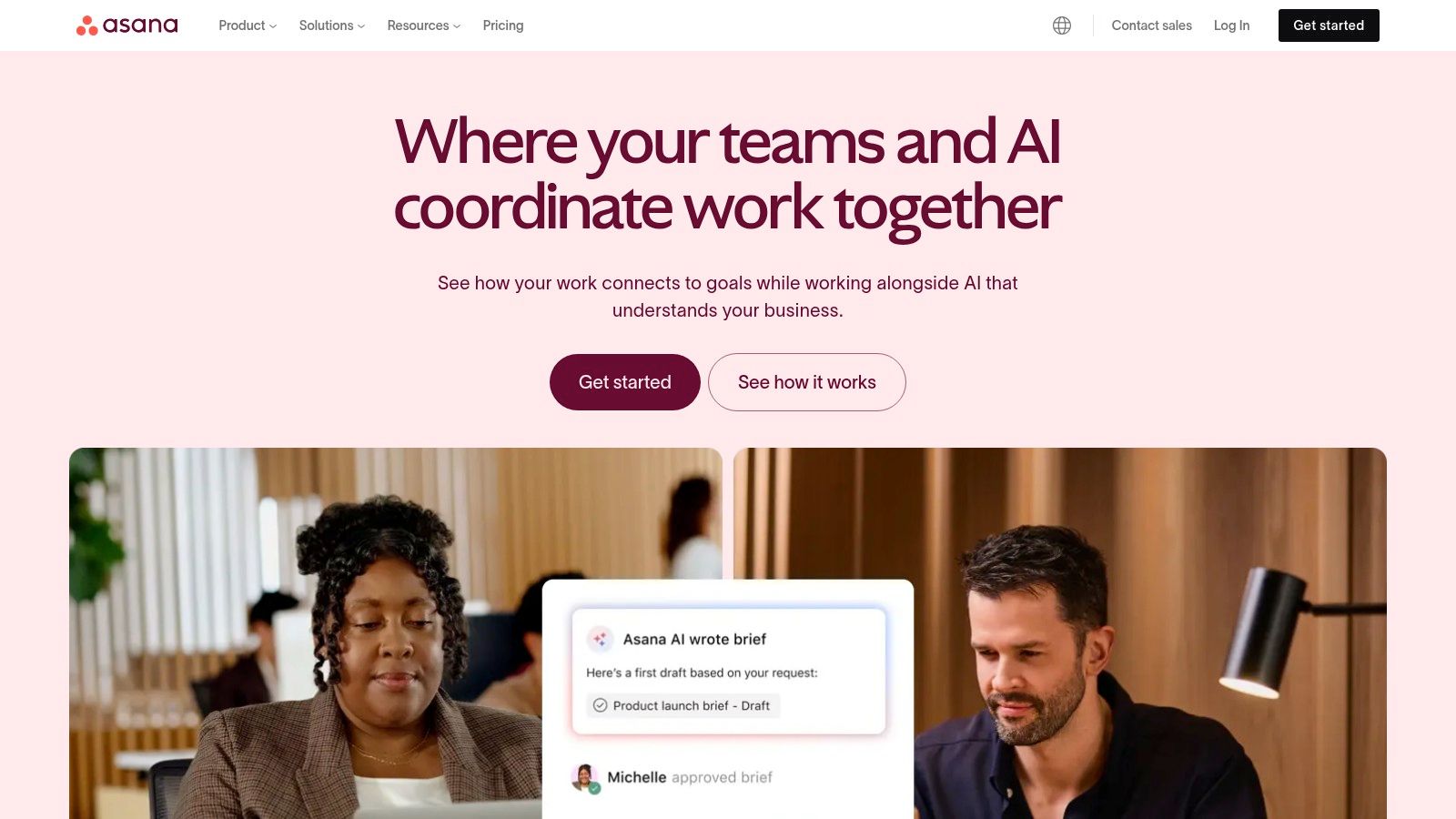
Practical Applications and Use Cases:
- Marketing Campaigns: Manage content creation, social media scheduling, and campaign deliverables using Asana's online kanban board to visualize workflow. The timeline view can be used to track deadlines and dependencies.
- Product Development: Track feature development, bug fixes, and releases. Asana's custom fields and subtasks allow for detailed task management, making it an effective online kanban board alternative for software teams.
- Sales Management: Manage leads, track deals through the pipeline, and monitor sales team performance. While not strictly an online kanban board application in this context, the list and calendar views provide valuable organizational structure.
- Operational Workflows: Streamline recurring tasks and processes, such as onboarding new hires or fulfilling client requests, using Asana's automation features. The online kanban board can visualize these workflows for improved efficiency.
Features and Benefits:
Asana offers a comprehensive suite of features that extend its utility beyond a basic online kanban board:
- Multiple Project Views: Kanban boards, lists, timelines, and calendars provide flexible visualization options for different project needs.
- Advanced Task Management: Dependencies, custom fields, and subtasks allow for granular control over task details.
- Workflow Automation: Automate repetitive tasks and streamline processes to free up team members for more strategic work.
- Workload View: Manage team capacity and prevent burnout by visualizing individual workloads and adjusting assignments as needed.
- Goal Tracking: Connect daily tasks to larger organizational objectives to ensure alignment and focus.
Pros and Cons:
Pros:
- Versatile platform adaptable to various work management styles.
- Robust reporting and dashboard capabilities offer valuable project insights.
- Strong integration ecosystem with over 200 apps extends functionality.
- Good balance of simplicity and powerful features.
Cons:
- Steeper learning curve compared to simpler online kanban board tools.
- Free version is limited to 15 users and basic features.
- Can become expensive for growing teams.
- Some users find the interface cluttered due to the numerous features.
Pricing and Technical Requirements:
Asana offers a free plan with limited features and user capacity. Paid plans start at around $10.99 per user per month and scale up depending on features and user count. As a web-based application, Asana is accessible on any device with an internet connection.
Implementation and Setup Tips:
- Start with a small project and gradually add more complex workflows.
- Utilize Asana's templates to quickly set up common project types.
- Invest time in training team members on the platform's features to maximize its effectiveness.
- Explore integrations with other tools your team uses to create a seamless workflow.
Website: https://asana.com
Asana earns its place on this list because it provides a comprehensive work management solution that incorporates the benefits of an online kanban board within a larger, more powerful platform. While simpler alternatives might suffice for basic kanban needs, Asana caters to teams requiring a more robust tool to manage the complexities of their projects, making it a valuable asset for enhanced productivity and collaboration.
4. Monday.com
Monday.com is more than just an online kanban board; it's a comprehensive Work OS designed to empower teams to manage entire projects, workflows, and operations from a single platform. While it offers a robust kanban view for visualizing and tracking work, its versatility extends far beyond basic task management. This makes it a powerful option for teams seeking a centralized, customizable solution, though it’s worth noting that this power comes at a price.
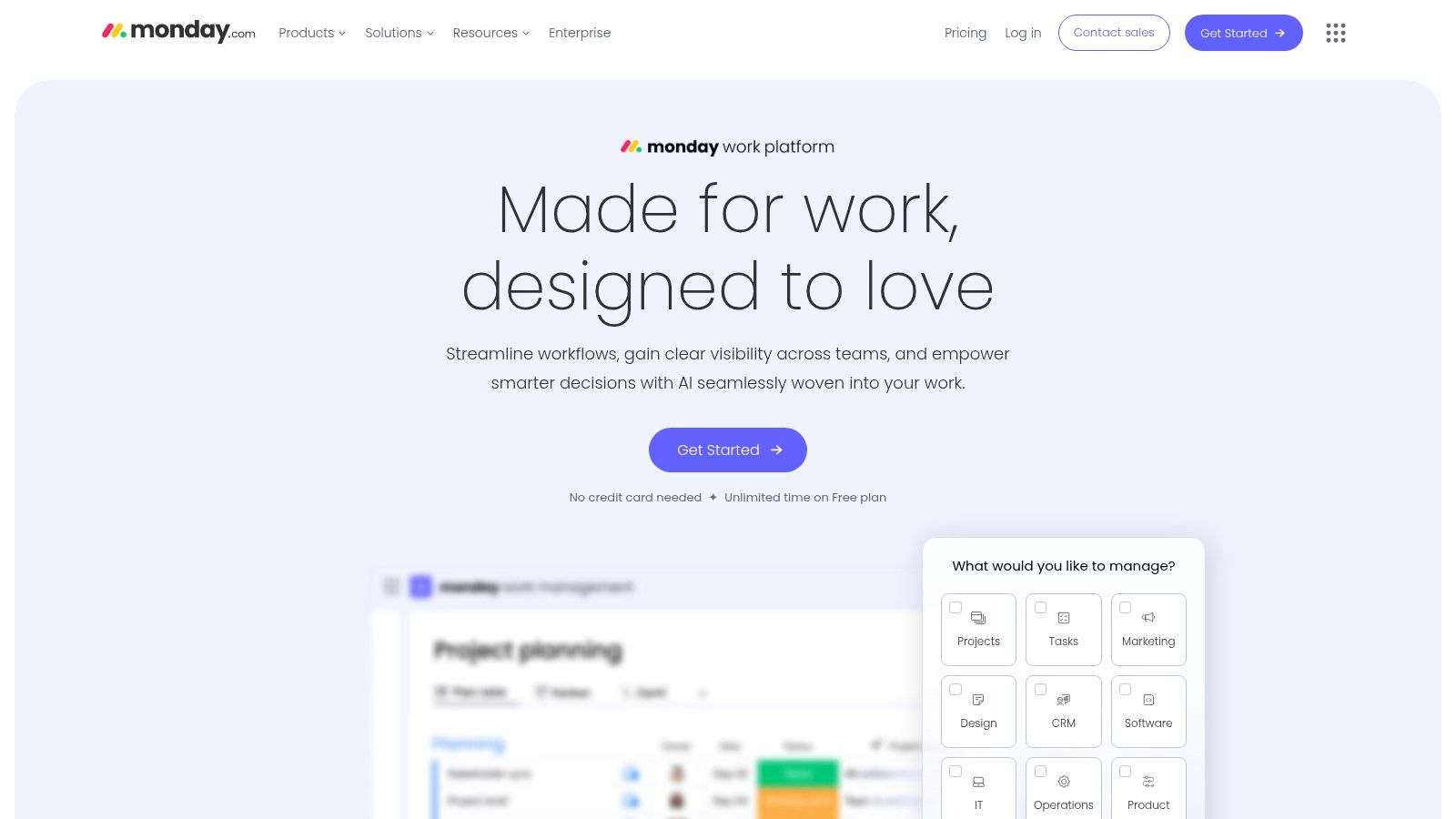
For project managers and team leads, especially those working within dynamic environments, Monday.com's adaptability is a significant advantage. Imagine managing a marketing campaign launch: You could use the kanban board to visualize the content creation workflow, then switch to a timeline view to track deadlines and dependencies. The workload view helps ensure team members aren't overloaded, while dashboards offer a high-level overview of campaign progress. Furthermore, its advanced automation capabilities streamline repetitive tasks, like assigning tasks based on status changes or sending notifications upon completion, freeing up time for strategic planning.
The platform's flexibility also caters to different team sizes and project complexities. Small businesses can leverage Monday.com's customizable templates to quickly set up project boards for various needs, from sales pipelines to product development roadmaps. Larger teams benefit from its robust resource management features and integration options, facilitating seamless collaboration across departments. For individuals and freelancers, the kanban board provides a clear, visual way to organize and prioritize tasks, while the integration with other tools can streamline workflows.
While Monday.com shines in its customization and visual appeal, its pricing structure deserves careful consideration. Unlike some online kanban board tools with free tiers, Monday.com operates on a subscription basis, which can become substantial for larger teams. The sheer breadth of features, while a strength, can also feel overwhelming for new users. Finally, some users have reported performance issues with exceptionally large and complex boards, which is something to bear in mind for large-scale projects.
Key Features and Benefits:
- Highly Customizable Kanban Boards: Tailor boards to match your specific workflow with customizable columns, labels, and statuses.
- Multiple View Options: Toggle between kanban, timeline, workload, and other views for a comprehensive project overview.
- Advanced Automations: Streamline repetitive tasks and optimize workflows with powerful automation rules.
- Robust Dashboards: Visualize key project metrics and track progress with customizable dashboards.
- Collaboration Features: Facilitate teamwork with @mentions, real-time updates, and file sharing.
Pros:
- Extremely flexible and customizable.
- Visually appealing and engaging interface.
- Strong collaboration features.
- Extensive template library.
Cons:
- Can be expensive, especially for larger teams.
- No free tier (only a free trial).
- Can be overwhelming with its extensive customization options.
- Performance can slow down with very large boards.
Website: https://monday.com
Monday.com earns its place on this list for its power and adaptability. It's a robust solution that goes beyond simple kanban boards, offering a central hub for managing all aspects of a project. While the cost may be a barrier for some, the platform's flexibility and extensive features make it a compelling choice for teams seeking a comprehensive Work OS. If you're looking for a highly customizable and visually appealing solution for managing complex projects and workflows, Monday.com is worth exploring.
5. Jira
Jira, developed by Atlassian, is a robust project management tool widely recognized for its strength in software development. Although initially designed for agile development and bug tracking, Jira’s customizable online kanban boards make it adaptable to diverse workflows, appealing to a wider range of project types beyond software development. Its powerful features allow teams to visualize work, manage projects, and track progress effectively. This versatility makes it a worthy contender for any team searching for a comprehensive online kanban board solution.
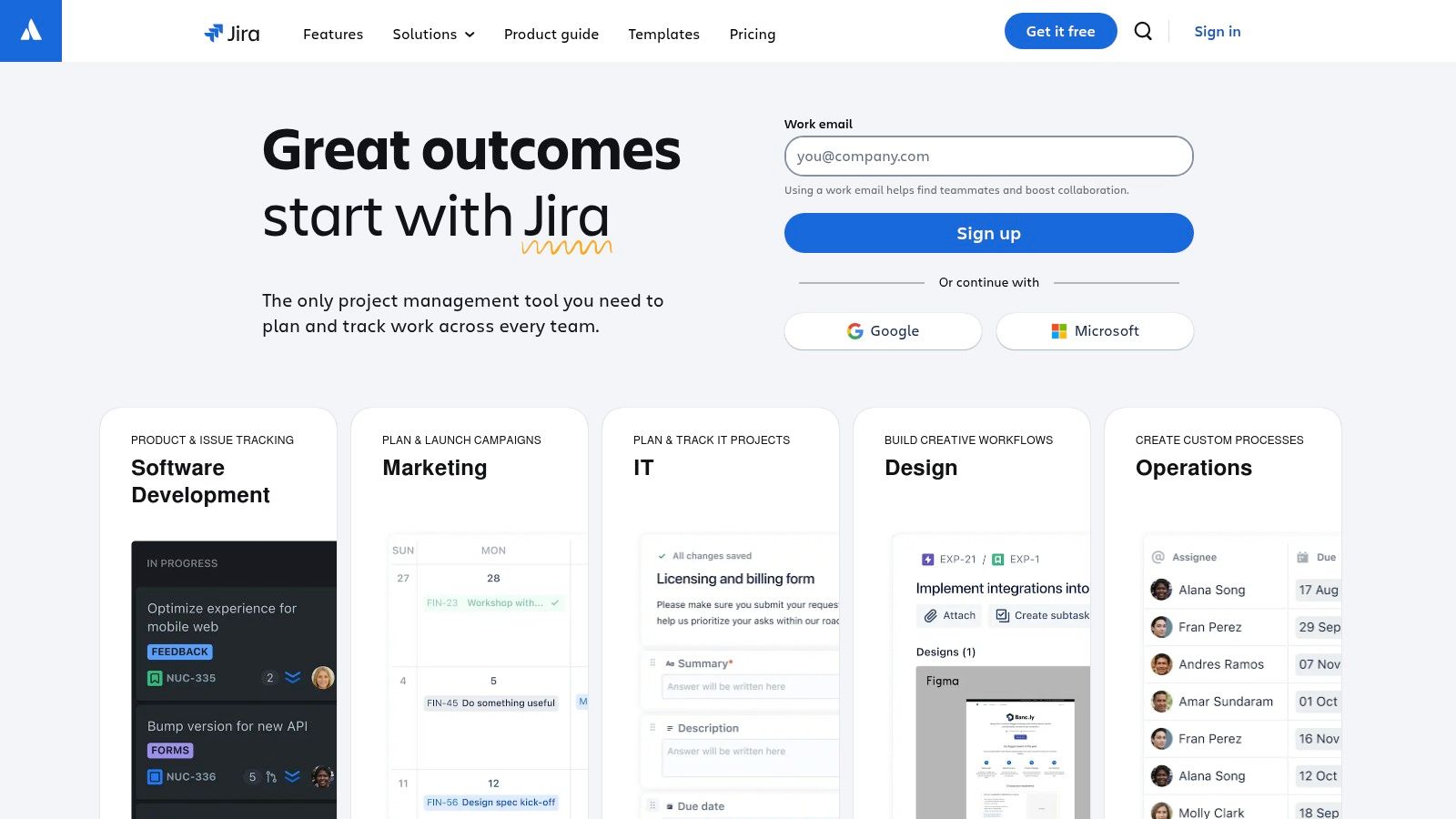
Jira’s strength lies in its customizable workflows and kanban boards specifically tailored to fit development processes. From simple task management to complex software sprints, Jira offers a granular level of control. Advanced reporting features, including burndown charts, velocity charts, and detailed sprint reports, provide valuable insights into project health and team performance. Furthermore, robust filtering and search capabilities prove invaluable when dealing with large backlogs, ensuring that teams can quickly locate and prioritize tasks. Roadmap planning and release management tools are integrated, allowing for long-term project visualization and strategic planning. For teams already embedded in the Atlassian ecosystem, Jira’s deep integration with other products like Confluence (for documentation) and Bitbucket (for code repositories) creates a seamless collaborative environment.
While Jira is exceptionally powerful for software development and technical teams, its complexity can be a double-edged sword. The steeper learning curve and extensive feature set can feel overwhelming for non-technical teams, and setup and administration often require dedicated resources. The user interface, while functional, isn't as intuitive as some of its simpler competitors. For those seeking a less complex solution, it's worth exploring alternatives. Learn more about Jira as an alternative for Kanban tasks.
Jira offers a range of pricing plans, starting with a free plan for small teams and scaling up to enterprise-level solutions. Pricing details are readily available on their website. Technical requirements are relatively minimal, as Jira is a cloud-based service accessible through any modern web browser. However, larger organizations may opt for self-hosted deployment options, which require more dedicated IT infrastructure.
For implementation, start with a basic kanban board and gradually customize it to your specific workflow. Utilize Jira's extensive documentation and online resources to fully leverage the platform's capabilities. Begin by defining your workflow stages, assigning team members, and prioritizing tasks. Experiment with different features and reporting options to find what best suits your team's needs. Consider using Jira's pre-built templates for common project types as a starting point for customization. While Jira's extensive features can be initially daunting, taking a phased approach to implementation can greatly simplify the process and unlock its full potential for effective project management. The investment in learning and setup is worthwhile for teams requiring a robust and adaptable online kanban board solution, particularly those in software development and other technical fields.
Finally, Jira's place on this list is secured by its unmatched power and flexibility for complex projects. While potentially overkill for simple task management, its comprehensive feature set, powerful reporting, and deep integrations make it a compelling choice for teams requiring advanced project management functionalities within their online kanban board. It's especially appealing for teams already using other Atlassian products, creating a cohesive and integrated workflow. Just be prepared for a learning curve and potential administrative overhead. For those who are up to the task, Jira can be a true project management powerhouse. You can learn more about Jira at https://www.atlassian.com/software/jira.
6. ClickUp: Your All-in-One Online Kanban Board Solution
ClickUp is more than just an online kanban board; it's a comprehensive productivity platform designed to consolidate all your work tools into one. While offering robust kanban board functionality, it also provides list, calendar, Gantt, and other views, making it a versatile solution for various project management styles. ClickUp’s highly customizable nature allows teams of all sizes and industries to tailor the platform to their specific workflows, making it a strong contender for teams seeking a centralized workspace. Whether you're managing marketing campaigns, software development sprints, or sales pipelines, ClickUp aims to be the single source of truth for all your team's work.
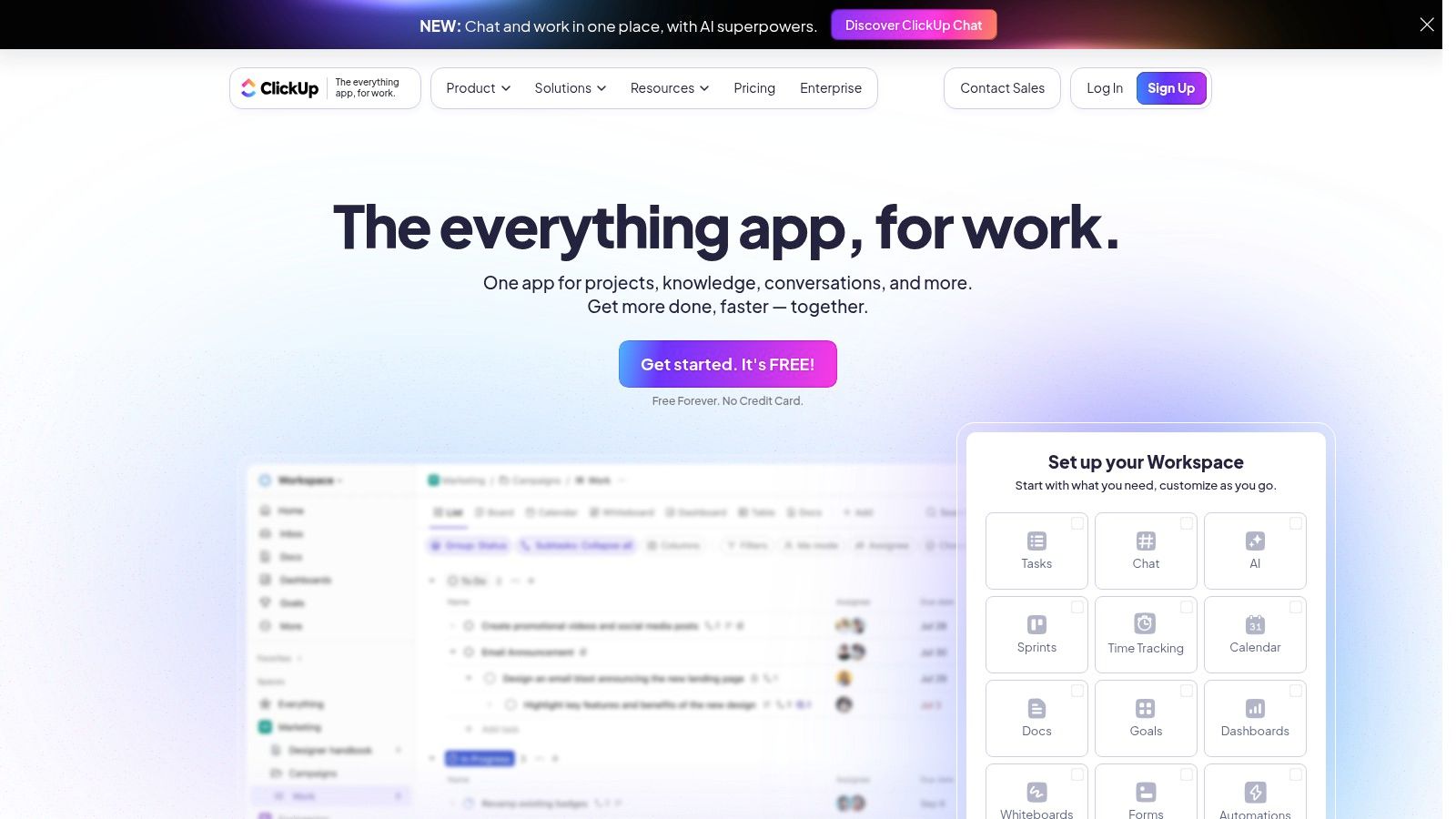
For teams already leveraging Google Workspace, ClickUp offers seamless integration, further streamlining workflows and reducing context switching. Imagine managing your online kanban board directly alongside your Google Docs, Sheets, and Calendar. This tight integration is particularly beneficial for project managers and team leads within the Google ecosystem. Small and medium-sized businesses seeking unified task and project management will appreciate the consolidated nature of ClickUp. Sales teams can benefit from the integrated CRM functionalities, managing leads and deals within the same platform as their project tasks. Even individual professionals and freelancers managing tasks within Gmail can leverage ClickUp's power to organize and prioritize their work.
Features and Benefits:
- Multiple View Options: Switch seamlessly between kanban boards, lists, calendars, Gantt charts, and more, catering to different project visualization preferences. This flexibility is crucial for adapting to the unique needs of various projects and team members.
- Customization: Tailor statuses, custom fields, and task relationships to match your specific workflow. This granular control ensures the online kanban board reflects your team's processes.
- Goals & OKR Tracking: Align daily work with overarching goals and objectives, fostering a results-oriented approach. This feature is particularly useful for teams focused on data-driven performance management.
- Built-in Time Tracking: Monitor time spent on tasks directly within the platform for accurate project budgeting and resource allocation.
- Knowledge Management: Centralize project documentation and wikis alongside your online kanban board, creating a single source of truth for all project-related information.
Pros:
- Comprehensive Feature Set: Reduces the need for multiple tools, streamlining workflows and reducing subscription costs.
- Generous Free Plan: Provides substantial functionality for individuals and small teams to get started without a financial commitment.
- Highly Customizable: Adapts to diverse team needs and workflows.
- Regular Updates & Responsive Support: Demonstrates a commitment to continuous improvement and user satisfaction.
Cons:
- Steep Learning Curve: The extensive feature set can be overwhelming initially, requiring time investment for mastery.
- Potential Performance Issues: Some users report occasional lags with large workspaces.
- Limited Mobile App: The mobile app doesn't offer the full functionality of the desktop version.
Pricing: ClickUp offers a free plan with unlimited tasks and members. Paid plans start at $5 per user per month and unlock additional features like increased storage, dashboards, and advanced reporting.
Technical Requirements: ClickUp is a web-based application accessible from any modern browser. Mobile apps are available for iOS and Android devices.
Implementation Tip: Start with a small project and gradually explore ClickUp’s features to avoid feeling overwhelmed. Leverage the available tutorials and documentation to familiarize yourself with the platform’s capabilities.
Website: https://clickup.com
ClickUp deserves a place on this list due to its powerful combination of a robust online kanban board with a comprehensive suite of project management tools. Its flexibility, customizability, and generous free plan make it a compelling option for teams seeking a unified platform to manage their work, especially those operating within the Google Workspace environment.
7. Notion
Notion has earned its place on this list of best online kanban boards due to its adaptable nature and powerful features that extend beyond basic project management. While not solely a kanban tool, its highly customizable databases offer robust kanban board functionality within a larger, integrated workspace. This makes it an excellent choice for teams who value a centralized hub for documentation, knowledge management, and project tracking. If you're seeking a powerful online kanban board that integrates seamlessly with a broader suite of tools, Notion is worth exploring.
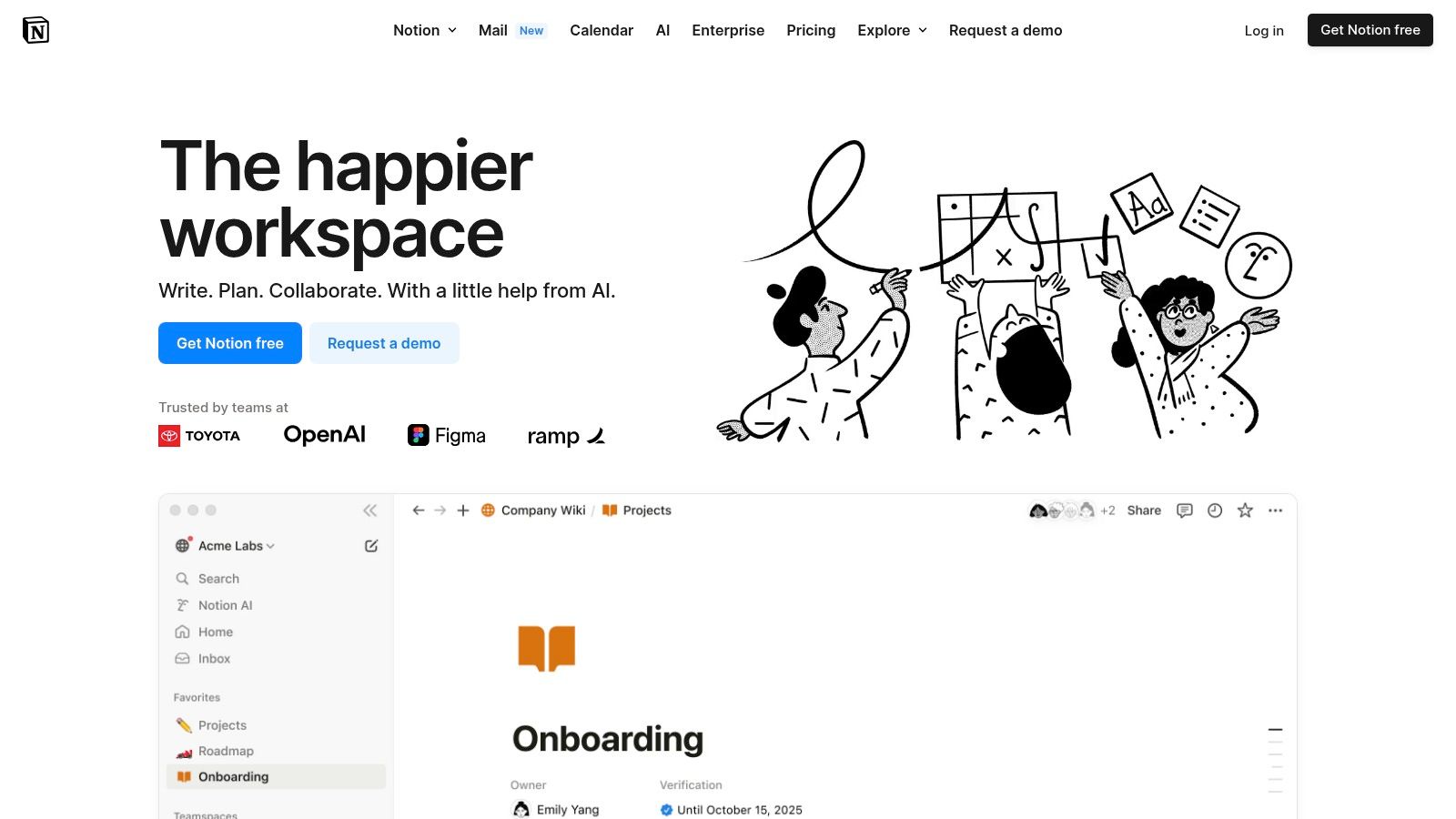
Notion's strength lies in its flexibility. Its database views, including kanban, calendar, list, and gallery, cater to diverse project visualization needs. Imagine a marketing team managing their content calendar in kanban view, then switching to a calendar view for scheduling, all within the same tool. This minimizes context switching and keeps everyone aligned. Rich text editing with markdown support allows for detailed task descriptions, meeting notes, and documentation directly within the kanban cards. Furthermore, nested pages enable hierarchical organization, perfect for breaking down complex projects into manageable sub-tasks and linking related documentation.
For teams already struggling with information silos, Notion offers a solution. Database relations and formulas allow you to link tasks to other databases, creating a connected information system. For instance, a sales team could link their kanban-based sales pipeline to a customer relationship management (CRM) database within Notion, providing a holistic view of each deal's progress and associated client information. This interconnectedness is a powerful feature that streamlines workflows and enhances collaboration.
Features:
- Flexible database structure with kanban, calendar, list, and gallery views
- Rich text editing with markdown support integrated with task management
- Nested pages for organizing work and documentation in hierarchies
- Templates for quick setup of common workflows
- Database relations and formulas for creating connected information systems
Pros:
- Unmatched flexibility in combining documentation with project management
- Clean, minimalist interface
- Ability to create a complete knowledge management system
- Strong free tier for personal use and small teams
Cons:
- Not purpose-built for project management, so may lack some specialized features found in dedicated tools like Trello or Asana.
- Can be slower to load than more focused tools.
- Limited offline functionality.
- Steeper learning curve for setting up complex workflows.
Pricing: Notion offers a free plan with limitations on the number of blocks you can create. Paid plans start at $8 per user per month, billed annually, and offer unlimited blocks, increased file uploads, and more collaboration features.
Technical Requirements: Notion is web-based and accessible through most modern browsers. It also offers desktop and mobile apps for Windows, macOS, iOS, and Android.
Implementation Tips:
- Start with a template: Notion offers a variety of pre-built templates for different workflows, including project management, content calendars, and meeting notes. This is a great way to get started quickly and learn how to use the tool effectively.
- Utilize nested pages: Leverage nested pages to create a hierarchical structure for your projects and documentation. This will keep everything organized and easy to navigate.
- Experiment with different database views: Don't be afraid to try out the different database views, such as kanban, calendar, list, and gallery, to find the best visualization for your needs.
Notion provides a powerful and flexible online kanban board solution, particularly for teams who value a unified workspace for documentation and project management. While it might require a bit more setup compared to dedicated kanban tools, its versatile nature and extensive features make it a valuable asset for those seeking an all-in-one platform. You can explore Notion and sign up at https://www.notion.so.
8. Kanbanize
Kanbanize stands out as a powerful online kanban board solution specifically designed for scaling the kanban methodology. This makes it a compelling choice for teams committed to lean project management and process optimization. If you're looking for a robust online kanban board that goes beyond basic task management and dives deep into workflow visualization, WIP limits, and flow metrics, Kanbanize is worth serious consideration. It's not just about managing tasks; it's about optimizing your entire workflow for maximum efficiency.

One of Kanbanize's key strengths lies in its multi-tiered kanban boards, which allow you to connect high-level strategic initiatives with day-to-day execution. This provides a clear line of sight from strategic goals down to individual tasks, fostering better alignment and transparency across the organization. For example, a marketing team could link a campaign objective (strategic initiative) to individual content creation tasks (execution) within Kanbanize, ensuring everyone understands how their work contributes to the bigger picture. This is particularly valuable for larger organizations and complex projects where keeping everyone on the same page can be challenging.
Furthermore, Kanbanize offers advanced WIP (Work In Progress) limits and flow analytics, which are essential for identifying bottlenecks and optimizing your workflow. Imagine a software development team using Kanbanize to visualize their development pipeline. By setting WIP limits for each stage (e.g., development, testing, deployment), they can prevent work from piling up and ensure a smooth flow of tasks. The built-in analytics then provide data-driven insights into cycle times, lead times, and other key metrics, allowing the team to identify areas for improvement and continuously refine their process. Beyond basic analytics, Kanbanize even includes Monte Carlo simulations for forecasting and planning, adding a layer of predictive capability to your project management.
While Kanbanize offers significant advantages for teams dedicated to kanban, it's important to consider the potential drawbacks. It sits at a higher price point compared to more general-purpose project management tools, which might be a barrier for smaller teams or those just starting with kanban. Additionally, the platform's depth of features can lead to a steeper learning curve compared to simpler tools. It's best suited for teams fully committed to embracing the kanban methodology and willing to invest the time to learn the platform's intricacies. Furthermore, while Kanbanize excels in its specialized features, it may lack the broad range of integrations found in some more general platforms.
Pricing: Kanbanize offers a variety of plans starting at $99/month for 15 users.
Technical Requirements: Kanbanize is a cloud-based platform accessible through a web browser, eliminating the need for specific software installations.
Implementation Tips:
- Start with a pilot project to familiarize your team with the platform before rolling it out organization-wide.
- Leverage Kanbanize's extensive documentation and training resources to maximize its potential.
- Begin with basic kanban principles and gradually explore the more advanced features as your team's understanding grows.
Kanbanize deserves its place on this list because it provides a dedicated and powerful platform for implementing and scaling the kanban methodology. While it's not a one-size-fits-all solution, teams seeking a specialized online kanban board with robust analytics and automation capabilities will find Kanbanize to be a valuable asset. You can explore more on their website: https://kanbanize.com
9. Teamwork
Teamwork earns its spot on this list of top online kanban boards because it offers a robust solution specifically tailored for client-based work. While many online kanban boards focus on internal team collaboration, Teamwork excels at managing client projects, resources, and even billable hours. This makes it a powerful tool for agencies, professional service firms, and anyone who needs to streamline client work within a single platform. If your team juggles multiple client projects and needs a centralized hub for managing tasks, communication, and billing, Teamwork deserves a close look.

Teamwork's online kanban board functionality provides the visual workflow management you expect, with customizable boards that allow you to define stages and move tasks through your pipeline. The ability to establish task dependencies and milestones ensures complex projects stay on track. What sets Teamwork apart, however, are the features specifically designed for client work. Time tracking is directly linked to tasks, making it easy to generate accurate billing and estimates. A dedicated client portal facilitates seamless collaboration with external stakeholders, keeping everyone informed and engaged. Resource management and workload balancing tools help you optimize team capacity and avoid bottlenecks.
For example, imagine a marketing agency managing multiple website development projects for different clients. Using Teamwork, they can create separate kanban boards for each project, visualize the progress of individual tasks (like design mockups, content creation, and development), track the time spent on each task for accurate billing, and communicate updates with clients through the portal. The built-in resource management features help ensure that designers and developers aren't overbooked, leading to smoother project delivery.
Key Features for Online Kanban Board Users:
- Customizable kanban boards: Tailor workflows to match your specific project needs.
- Task dependencies and milestones: Manage complex projects effectively by visualizing relationships between tasks.
- Time tracking: Log time directly against tasks for accurate billing and project costing.
- Client portal: Enable seamless communication and collaboration with external stakeholders.
- Resource management: Optimize team capacity and allocate resources effectively.
Pros:
- Strong focus on client work and billable projects
- Good balance between ease of use and powerful features
- Comprehensive solution including project management, CRM, and billing
- Privacy controls for client collaboration
Cons:
- Higher pricing than some alternatives (plans start at $5.99/user/month)
- Interface can feel dated compared to newer, more visually sleek tools
- Mobile experience not as robust as the desktop version
- Some advanced features may require a learning curve
Implementation Tips:
- Start with a free trial to explore the platform and its features.
- Begin by creating a kanban board for a single project to familiarize yourself with the interface.
- Utilize the client portal to enhance communication and streamline feedback processes.
- Explore the resource management tools to optimize team workload and project timelines.
Teamwork is a powerful online kanban board solution that goes beyond basic task management to provide a comprehensive platform for managing client work, resources, and billing. While the pricing may be higher than some alternatives and the interface could benefit from a refresh, the robust features and client-centric focus make it an excellent choice for agencies, professional service firms, and other client-focused businesses. You can explore Teamwork and sign up for a free trial at https://www.teamwork.com.
10. MeisterTask: A Visually Appealing Online Kanban Board for Streamlined Teamwork
MeisterTask earns its spot on this list as a top contender for teams prioritizing an intuitive and visually appealing online kanban board. Its clean interface and focus on simplicity make it incredibly easy to get started with, even for teams unfamiliar with kanban. This makes it a particularly strong choice for small and medium-sized businesses, or individual professionals and freelancers, looking for a straightforward way to manage tasks and projects within a clean, digital workspace. If you're seeking a balance between ease of use and core kanban functionality, MeisterTask is definitely worth exploring.
MeisterTask’s core strength lies in its user-friendly design. The drag-and-drop interface for task management is incredibly intuitive, allowing teams to quickly visualize their workflow and move tasks through various stages. This is particularly beneficial for project managers and team leads who need a clear overview of project progress, especially if they're operating within a fast-paced environment. The customizable workflows allow you to adapt the online kanban board to fit your specific project needs, whether you're managing a sales pipeline, software development sprints, or marketing campaigns.
Beyond basic kanban functionality, MeisterTask offers several features to enhance productivity. Automated task rules streamline repetitive actions, saving valuable time. For example, you could set a rule to automatically assign tasks to specific team members based on the project phase or notify stakeholders when a task reaches completion. Built-in time tracking with detailed reports offers valuable insights into project timelines and resource allocation. This data-driven approach is beneficial for identifying bottlenecks and improving team efficiency. The native integration with MindMeister, a mind-mapping tool, further extends MeisterTask's functionality, allowing for seamless brainstorming and project planning directly within the platform. Individual tasks can contain multiple checklists and file attachments, ensuring all relevant information is centralized and accessible.
Pros:
- Exceptionally clean and user-friendly interface, minimizing the learning curve for new users.
- Quick setup and implementation, allowing teams to start using the online kanban board almost immediately.
- A solid free tier caters to basic kanban needs, making it accessible to smaller teams or individuals.
- Strikes a good balance between simplicity and functionality, offering essential features without overwhelming the user.
Cons:
- Offers fewer advanced features compared to more comprehensive enterprise solutions like Jira or Asana.
- Limited reporting capabilities in the lower pricing tiers might restrict data analysis for larger projects.
- Fewer integrations compared to some competitors, potentially limiting seamless connectivity with other tools in your workflow. While MindMeister integration is a plus, broader integration options would strengthen its capabilities.
- Might not be suitable for highly complex project structures with intricate dependencies and workflows. Simpler project management scenarios are where MeisterTask truly shines.
Pricing: MeisterTask offers a free basic plan, suitable for individuals and small teams. Paid plans, with additional features and user capacity, are also available. Check their website for current pricing details.
Technical Requirements: MeisterTask is a web-based application, accessible from any modern browser. Mobile apps are available for iOS and Android devices, ensuring accessibility on the go.
Website: https://www.meistertask.com
MeisterTask positions itself as a user-friendly alternative to more complex online kanban board solutions. Its intuitive design and core features make it a great choice for teams or individuals looking to streamline their workflow without being bogged down by complicated features. If visual clarity, simplicity, and ease of use are your top priorities, MeisterTask deserves a place in your toolkit.
Top 10 Online Kanban Tools Comparison
| Product | Core Features / Integration ✨ | User Experience ★ | Value Proposition 💰 | Target Audience 👥 | Unique Selling Points 🏆 |
|---|---|---|---|---|---|
| Tooling Studio 🏆 | Native GSuite integration, Kanban + Sales CRM (beta) | ★★★★☆ Near-native, intuitive | 💰 Affordable, user-driven | 👥 Professionals, teams, enterprises | ✨Real-time collaboration, Gmail-native |
| Trello | Kanban boards, Power-Ups, automation | ★★★★☆ Simple, visual | 💰 Free tier, paid upgrades | 👥 Small to medium teams | ✨Easy to use, extensive integrations |
| Asana | Kanban, timelines, automation, goal tracking | ★★★★☆ Versatile, dashboard | 💰 Free tier limited, paid plans | 👥 Medium to large teams | ✨Multiple project views, reporting |
| Monday.com | Custom boards, automation, dashboards | ★★★★☆ Colorful, flexible | 💰 No free tier, pricey plans | 👥 Teams needing customization | ✨Highly customizable, extensive templates |
| Jira | Custom workflows, reports, sprint & issue tracking | ★★★☆☆ Powerful but complex | 💰 Paid plans, enterprise focus | 👥 Software dev and technical teams | ✨Deep agile & dev tool integration |
| ClickUp | Kanban + many views, goals, time tracking, docs | ★★★★☆ Feature-rich but complex | 💰 Generous free plan + paid | 👥 Teams needing all-in-one tool | ✨Highly customizable, frequent updates |
| Notion | Kanban + docs, customizable DBs, templates | ★★★☆☆ Flexible, minimalist | 💰 Strong free tier for personal | 👥 Knowledge workers, SMBs | ✨All-in-one workspace, rich text support |
| Kanbanize | Multi-tier kanban, WIP limits, flow analytics | ★★★★☆ Specialized, detailed | 💰 Higher price, enterprise | 👥 Lean teams, process-focused | ✨Advanced kanban & flow optimization |
| Teamwork | Kanban, time tracking, client portal, billing | ★★★☆☆ Comprehensive but dated | 💰 Premium pricing | 👥 Agencies, client services | ✨Client collaboration, integrated billing |
| MeisterTask | Intuitive kanban, automation, time tracking | ★★★☆☆ Clean & simple | 💰 Solid free tier availability | 👥 Small teams, simplicity seekers | ✨MindMeister integration, ease of use |
Choosing Your Perfect Online Kanban Board
Finding the right online Kanban board can significantly impact your team's productivity and project success. We've explored ten popular options, from versatile platforms like Trello and Asana to more specialized tools like Jira and Kanbanize. Remember the key takeaways: consider your team size and project complexity. Do you need seamless integrations with your existing workflow, like Google Workspace or a CRM? And of course, budget plays a role. For development teams, especially, selecting a Kanban board that streamlines workflows is crucial. As Mergify suggests, focusing on factors that improve developer experience like ease of use, integrations, and customization options can significantly boost productivity.
Choosing between tools like Monday.com, ClickUp, Notion, Teamwork, and MeisterTask requires careful consideration of their specific strengths and how they align with your needs. Whether you're a project manager juggling complex projects, a sales team tracking leads, a small business owner seeking a unified platform, a freelancer organizing tasks within Gmail, or a Google Workspace administrator streamlining operations, there's an online Kanban board tailored for you. By carefully evaluating these options based on your requirements, you can transform your project management and unlock your team's full potential.
Ready to streamline your workflow within Google Workspace? Tooling Studio offers a powerful online Kanban board solution tightly integrated with Google Workspace apps, empowering your team to manage tasks and projects efficiently, all within a familiar environment. Explore Tooling Studio today and experience the difference a seamlessly integrated Kanban board can make.